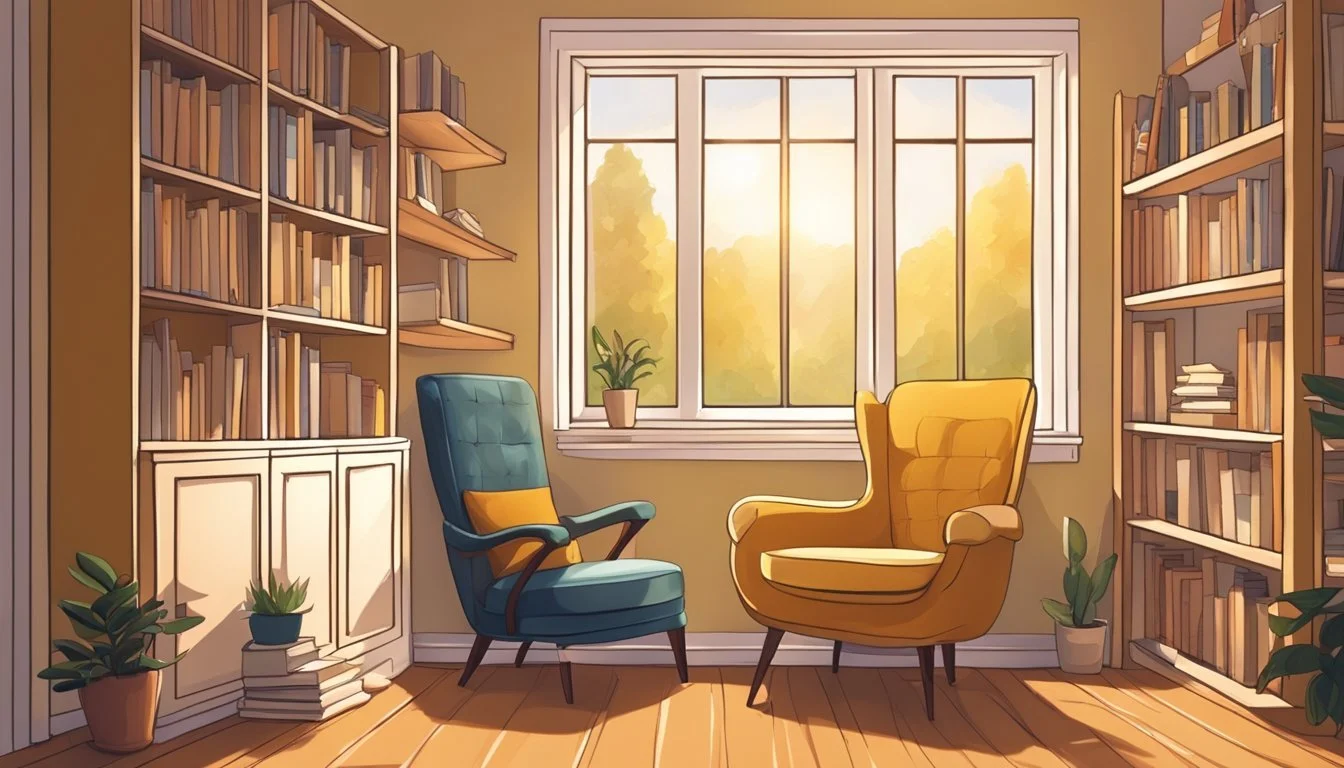12 Quotes That Capture the Essence of Introversion
Understanding the Quiet Strength Within
Introversion is a personality trait characterized by a preference for quiet, low-stimulation environments and a focus on inner thoughts and feelings. While often misunderstood, introverts possess unique strengths and perspectives that enrich the world around them.
Quotes about introversion can provide insight, validation, and inspiration for those who identify with this personality type. These carefully chosen words from various thinkers, leaders, and celebrities capture the essence of the introverted experience, highlighting both its challenges and its rewards. They offer a window into the rich inner world of introverts and celebrate the power of quiet reflection.
1) "I have to be alone very often. I'd be quite happy if I spent from Saturday night until Monday morning alone in my apartment. That's how I refuel." - Audrey Hepburn
Audrey Hepburn's quote encapsulates the essence of introversion. The iconic actress and humanitarian expressed a deep need for solitude, highlighting how introverts replenish their energy.
For introverts, spending extended periods alone is not just a preference but a necessity. Hepburn's words resonate with those who find peace and rejuvenation in quiet, uninterrupted time.
The specific timeframe mentioned - from Saturday night to Monday morning - emphasizes the importance of dedicating substantial blocks of time to solitary activities. This aligns with the introvert's tendency to plan for and protect their alone time.
Hepburn's use of the word "refuel" is particularly apt. It illustrates how solitude acts as a source of energy for introverts, allowing them to recharge and prepare for social interactions.
This quote also challenges the notion that constant social engagement is necessary for happiness. It presents an alternative perspective, where contentment is found in the comfort of one's own company and personal space.
2) "Don't think of introversion as something that needs to be cured." - Susan Cain
Susan Cain's quote challenges the notion that introversion is a flaw. This perspective encourages introverts to embrace their natural tendencies rather than trying to change them.
Cain, author of "Quiet: The Power of Introverts in a World That Can't Stop Talking," emphasizes that introversion is a valid personality trait. Her words remind introverts that their preferences and behaviors are not deficiencies.
This quote highlights the importance of self-acceptance for introverts. It suggests that introverts should feel comfortable with their need for solitude and reflective time.
Cain's statement also addresses societal pressures that often favor extroverted traits. By framing introversion as something that doesn't need curing, she pushes back against these expectations.
The quote encourages introverts to value their unique strengths. These may include deep thinking, careful observation, and the ability to form meaningful connections in smaller settings.
3) "Solitude matters, and for some people, it's the air they breathe." - Susan Cain
This quote by Susan Cain encapsulates a fundamental aspect of introversion. It emphasizes the vital role solitude plays in the lives of introverts.
For many introverts, time alone is not just a preference but a necessity. They find rejuvenation and inner peace through solitary moments, much like breathing air.
Cain's analogy highlights how essential quiet reflection is for introverts to function optimally. It's not merely a luxury, but a core component of their well-being.
This perspective challenges the extrovert-centric view prevalent in many societies. It validates the introvert's need for solitude as a natural and healthy trait.
The quote also suggests that introverts process the world differently. They often require time alone to recharge their mental and emotional batteries.
By comparing solitude to air, Cain underscores its life-sustaining quality for introverts. It's a powerful reminder that embracing one's need for solitude is crucial for personal growth and happiness.
4) "Sometimes quiet people really do have a lot to say, they're just being careful about who they open up to." - Susan Gale
This quote by Susan Gale captures a fundamental aspect of introversion. It challenges the common misconception that introverts are simply quiet or have nothing to contribute.
In reality, introverts often have rich inner worlds filled with thoughts, ideas, and observations. They process information deeply and reflect on their experiences before sharing them.
The key difference lies in their selectivity. Introverts tend to be more discerning about whom they share their thoughts with and when. This careful approach stems from a desire for meaningful connections and conversations.
Introverts may take time to build trust before opening up fully. They value quality over quantity in their interactions, preferring depth to superficial small talk.
This quote reminds us that silence doesn't equate to emptiness. It encourages understanding and patience when interacting with quieter individuals, recognizing that they may have valuable insights to share when they feel comfortable doing so.
5) "Introverts need to trust their gut and share their ideas." - Carey Lohrenz
Carey Lohrenz, a former fighter pilot and leadership expert, emphasizes the importance of introverts trusting their instincts and voicing their thoughts. This quote encourages introverts to overcome self-doubt and share their unique perspectives.
Introverts often possess valuable insights due to their thoughtful nature and keen observation skills. Their tendency to process information deeply can lead to innovative ideas and solutions.
By trusting their gut feelings, introverts can tap into their inner wisdom and contribute meaningfully to discussions and projects. This self-confidence allows them to overcome hesitation and speak up when it matters most.
Sharing ideas can be challenging for introverts, who may prefer to keep their thoughts private. However, expressing oneself is crucial for personal growth and professional success.
When introverts overcome their reluctance to speak up, they often surprise others with the depth and quality of their contributions. This can lead to increased respect and recognition in various settings.
6) "In a gentle way, you can shake the world." - Mahatma Gandhi
This quote resonates deeply with introverts who often prefer subtle approaches to making an impact. Gandhi's words emphasize the power of quiet influence and non-violent action.
Introverts typically excel at thoughtful communication and deep listening. These gentle qualities can be highly effective in bringing about positive change in personal relationships and wider society.
The phrase "shake the world" suggests that significant transformations are possible through gentle means. This aligns with many introverts' preference for calm, measured approaches rather than forceful or aggressive tactics.
Gandhi's quote encourages introverts to embrace their natural tendencies toward reflection and careful consideration. It validates the idea that one need not be loud or domineering to effect meaningful change.
For introverts, this quote serves as a reminder that their unique strengths can be powerful tools for influencing the world around them. It reinforces the value of authenticity and staying true to one's introspective nature.
7) "Silence is a source of great strength." - Lao Tzu
Lao Tzu's words encapsulate a core aspect of introversion. This ancient Chinese philosopher recognized the power that lies in quietude.
For introverts, silence is not merely the absence of noise. It serves as a wellspring of inner fortitude and clarity.
In moments of stillness, introverts often find renewal. They can recharge their mental and emotional batteries, emerging refreshed and focused.
Silence allows for deep reflection and introspection. It provides space for introverts to process their thoughts and feelings without external interference.
This quote resonates with many introverts who find solace in solitary pursuits. Reading, meditating, or simply enjoying nature in silence can be profoundly energizing experiences.
Lao Tzu's insight reminds us that strength does not always manifest loudly. Sometimes, the quietest individuals possess the most inner resilience.
For introverts, embracing silence is not a sign of weakness. Rather, it is a deliberate choice to tap into their natural source of power and stability.
8) "Introverts recharge their batteries by being alone." - Jonathan Rauch
This quote by Jonathan Rauch succinctly captures a fundamental aspect of introversion. Introverts often find solitude essential for maintaining their mental and emotional well-being.
Unlike extroverts who gain energy from social interactions, introverts typically feel drained after prolonged exposure to social situations. They require time alone to reflect, process information, and restore their energy levels.
This need for solitude doesn't mean introverts dislike people or socializing. Rather, it reflects their internal processing style and the way their brains respond to stimulation.
Quiet time allows introverts to recharge, much like plugging in a device to replenish its battery. This can involve activities such as reading, meditating, or simply enjoying a peaceful environment without external demands.
Understanding this aspect of introversion can help both introverts and extroverts navigate social dynamics more effectively. It emphasizes the importance of respecting introverts' need for alone time and recognizing it as a vital component of their well-being.
9) "My imagination functions much better when I don't have to speak to people." - Patricia Highsmith
Patricia Highsmith, renowned author of psychological thrillers, captured a fundamental aspect of introversion with this quote. Her words resonate with many introverts who find solitude conducive to creativity.
For introverts, social interactions can be mentally taxing. Highsmith's statement reflects the need for quiet time to recharge and tap into their inner world.
The quote highlights the connection between solitude and imagination. Many introverts report feeling more creative and productive when they have uninterrupted time alone with their thoughts.
Highsmith's perspective aligns with research suggesting that introverts often excel in tasks requiring deep focus and independent thinking. This includes creative pursuits like writing, art, and problem-solving.
The author's words also touch on the introvert's preference for internal dialogue over external conversation. This introspective nature can lead to rich inner landscapes and innovative ideas.
10) "Solitude is where I place my chaos to rest and awaken my inner peace." - Nikki Rowe
This quote encapsulates the introspective nature of introverts and their need for solitude. Nikki Rowe's words highlight the transformative power of alone time for those who seek inner peace.
For introverts, solitude serves as a sanctuary where the noise of the world fades away. It provides a space to process thoughts, emotions, and experiences without external distractions.
In moments of solitude, introverts can untangle the chaos of daily life. They find clarity and restore their mental energy, which is often depleted by social interactions and overstimulation.
The phrase "awaken my inner peace" suggests that solitude is not just about rest, but also about renewal. It allows introverts to reconnect with their core selves and find balance.
This quote resonates with many introverts who view alone time not as isolation, but as a vital practice for maintaining emotional and mental well-being. It affirms the value of solitude in a world that often prioritizes constant connection and activity.
11) "For introverts, to be alone with our thoughts is as restorative as sleeping, as nourishing as eating." - Jonathan Rauch
This quote by Jonathan Rauch eloquently captures the essence of introversion. It highlights the profound importance of solitude for introverts.
Introverts gain energy from time spent alone, engaged in quiet reflection. This solitary contemplation is not merely enjoyable; it is essential for their well-being.
Rauch's analogy to sleeping and eating underscores how vital alone time is for introverts. Just as sleep rejuvenates the body and food nourishes it, solitude replenishes an introvert's mental and emotional reserves.
This need for solitude does not stem from antisocial tendencies or depression. Rather, it is a fundamental aspect of introvert psychology. Introverts process information and experiences deeply, requiring time alone to do so effectively.
Recognizing and respecting this need is crucial for introverts and those who interact with them. It allows introverts to function at their best, contributing their unique perspectives and strengths to the world around them.
12) "An introvert by nature, I need the simple life, the ordinary life, keeping my balance, always on the straight and narrow." - João Gilberto
João Gilberto, the renowned Brazilian musician, captured the essence of introversion in this quote. He expressed a deep appreciation for simplicity and routine in his life.
Introverts often find comfort in the ordinary aspects of daily existence. They tend to thrive in environments that allow for quiet reflection and minimal disruption.
The concept of balance resonates strongly with many introverts. They frequently seek equilibrium between social interactions and solitary pursuits.
Gilberto's reference to staying on the "straight and narrow" suggests a preference for consistency and predictability. This aligns with the introverted tendency to avoid excessive stimulation or dramatic changes.
For introverts like Gilberto, a simple life provides the space needed for introspection and creativity. It allows them to recharge their energy and maintain their inner peace.
Understanding Introversion
Introversion is a complex personality trait characterized by a preference for less stimulating environments and more time for internal reflection. It encompasses a range of behaviors and tendencies that shape how introverts interact with the world around them.
Defining Introversion
Introversion refers to a personality type that draws energy from solitude and inner experiences. Introverts tend to feel drained by prolonged social interactions and often need time alone to recharge. They typically:
• Prefer deeper one-on-one conversations • Enjoy solitary activities like reading or hiking • Process information internally before speaking • Feel most creative and productive when working independently
This inward focus allows introverts to develop rich inner worlds and engage in thoughtful analysis. While they can be social, introverts generally prefer smaller gatherings and meaningful connections over large crowds or small talk.
Common Myths About Introverts
Despite growing awareness, misconceptions about introversion persist. Some common myths include:
Introverts are shy or antisocial
Introversion is a flaw to overcome
Introverts don't like people
In reality, many introverts are confident and enjoy socializing in moderation. Introversion is simply a different way of interacting with the world, not a deficiency. Introverts often form deep, lasting relationships but may be selective about their social circles.
Introverts can excel in leadership roles, public speaking, and other outward-facing activities. They bring valuable skills like listening, observation, and thoughtful decision-making to these roles. The key is finding a balance that allows for both social engagement and restorative solitude.
Psychological Insights
Introversion is a complex personality trait with significant psychological implications. It influences mental health and offers unique advantages that contribute to personal growth and well-being.
Introversion and Mental Health
Introverts process stimuli differently than extroverts, which can impact their mental health. They often require more downtime to recharge after social interactions. This need for solitude is not a sign of depression or anxiety, but a natural part of their psychological makeup.
Introverts may be more prone to overthinking, which can sometimes lead to increased stress or rumination. However, their tendency for self-reflection also allows for deeper self-awareness and emotional intelligence.
Research suggests introverts may be more vulnerable to certain mental health challenges in highly stimulating environments. Crowded, noisy spaces can be overwhelming and potentially trigger anxiety or fatigue in introverts.
Benefits of Being Introverted
Introverts possess several psychological strengths that can enhance their personal and professional lives. Their ability to focus deeply on tasks often leads to increased productivity and creativity.
Introverted individuals typically excel at:
Active listening
Thoughtful decision-making
Analytical thinking
Self-reflection
These qualities can result in stronger, more meaningful relationships and effective problem-solving skills. Introverts often have rich inner lives, which can foster innovation and artistic expression.
Their preference for quieter environments may also contribute to lower stress levels in certain situations. This calm demeanor can be particularly valuable in crisis management or high-pressure work scenarios.











